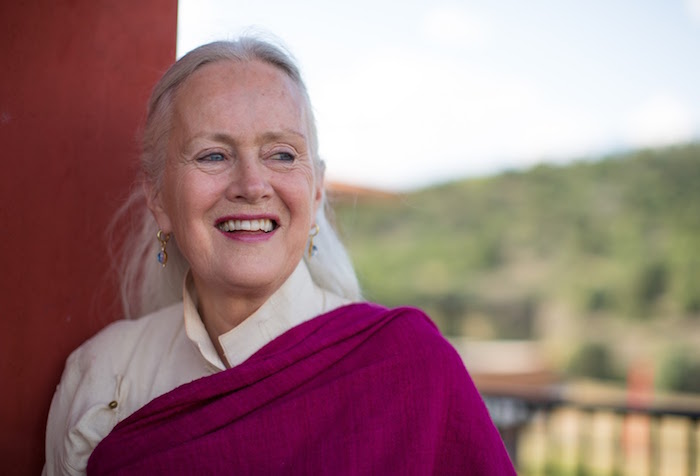
The following article originally appeared on the Shambhala Times, our partners in creating enlightened society. In this post, Cameron Wenaus of Retreat Guru and Sarah Lipton, Editor-in-Chief of the Shambhala Times conducted an interview with Lama Tsultrim Allione of Tara Mandala, as part of their Radical Compassion column. Many thanks to Lama Tsultrim Allione for offering her profound teachings. Thanks as well to J.R. Gilness for writing the piece, and Emma Sartwell for transcribing the interview.
~
Shambhala Times Exclusive Interview with Lama Tsultrim Allione
It seems daunting to address societal demons when we’ve got enough inner demons of our own, but Lama Tsultrim Allione has a different take. She says: “Think globally and work locally.”
“It is overwhelming when you take it altogether,” she says of collective societal demons. But by addressing the situations in our own communities, we find a container for those demons that brings them into perspective.
Lama Tsultrim encourages people to confront societal demons by asking them the same questions we ask our personal demons: “What do you want? What do you really need? How will you feel if you get what you really need?”
“Find out what’s under the want, because often what the demon appears to need or to want is not the real need.” What lies beneath those desires is often something else—something totally different from what appears on the surface. Negative habits belie deeper needs that reveal themselves in the process of feeding our demons. If you can get to the need at the root of the apparent desire and feed it, says Lama Tsultrim, “you can create a definitive transformation.”
In other words, it is about getting at the underlying need that is triggering the demon.
Lama Tsultrim emphasizes the difference between needs and wants, which becomes muddled by the pace of modern life. This is a challenge of speed and materialism: as our life goes faster and it seems like things are getting easier, we wonder why we have less and less time. And what we want often contradicts what we really need, so we may get what we want, but still feel dissatified because we have not addressed the underlying need. A simple example of this is that we might want a cigarette and so smoke one after the other, but we don’t feel satisfied because the need behind the addiction is still there.
We have all thought about this in terms of modern materialism and consumerism. Christmas is an excellent example. For children this holiday is often a materialistic orgy of gifts with paper flying and new plastic stuff emerging. Lama Tsultrim recounts watching her five-year-old granddaughter, “build up the excitement of Christmas morning so much that she was hardly able to go to sleep the night before. At dawn she rushed downstairs, got her stocking by the fireplace and tore through the gifts inside. She then pounced on her presents under the tree, not stopping to look around at anything else. Within a half an hour all the presents were opened and piles of paper lay around her.” Lama Tsultrim continues saying, “she then came over to sit by me with tears in her eyes. She was very quiet. I asked if she felt kind of empty. She nodded sadly.”
It’s become a cliché to say that we live under the illusion that if we get what we want, we’ll be fulfilled. But Lama Tsultrim goes deeper with the idea of societal demons.
“This isn’t only in terms of material things that you could get like Christmas presents, but the things society tells us are going to make us happy—like getting the ultimate relationship, the ultimate vacation, the ultimate job, or whatever it is,” she explains. “There’s a feeling that there is something out there that’s going to bring us that feeling of true happiness and satisfaction. We’re finally going to get ‘it’ at the end of a long search, and we’re going to get it by moving out with our energy. Its ‘out there’ somewhere.”
With nature-of-mind meditation, however, we turn that out-moving energy around, 180 degrees. “The grasping mind turns back and looks at its source, and when mind looks at mind you don’t find a ‘thing’, so we say the nature of mind is empty.” As Lama Tsultrim puts it, “Looking back with awareness at awareness—what we see is emptiness. That emptiness is cognizant, however, it is not a black hole. Resting in that empty radiance and turning away from the outward movement of materialism and speed and into our true nature, is, quite simply, liberation.”
The good news is that we don’t have to drop out of society to transform societal demons. We need to work within society to transform them. If we work with the demon of racism, for example, we work with the demons of racism in ourselves and the demons from the feelings we get from the outer racism in our society. Or, we work with the demons of fear, anger and trauma that come from being a minority or an oppressed group.
Tara Mandala, Lama Tsultrim’s retreat center, is now beginning a series of teachings and social engagement projects using the program Feeding Your Demons of Racism with police departments, gang leaders, privileged people and oppressed populations. The path here is working with the societal demons of racism by working with personal reactions to collective demons. This does not, by any means, preclude necessary outer social change, but gets right to the heart of the demons of racism in its many layers and forms from the inside out. “We work with the underlying causes of racism, and that is part of the way society is transformed,” Lama Tsultrim shares.
Societal demons do not have to be daunting to work with. They require the same attention as our individual demons. As Lama Tsultrim emphasizes, “Change begins at home.”
~
Author: J.R. Gilness, with Sarah Lipton, Cameron Wenaus
Editor: Travis May
Image: Tara Mandala






Read 0 comments and reply